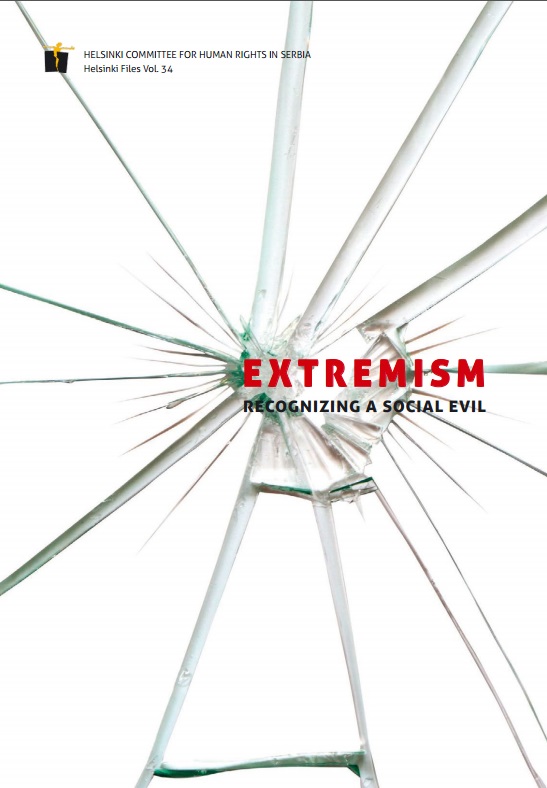
We kindly inform you that, as long as the subject affiliation of our 300.000+ articles is in progress, you might get unsufficient or no results on your third level or second level search. In this case, please broaden your search criteria.

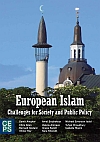
The urgent need to tackle the discrimination faced by Muslims in Europe has emerged as a key concern of European policy-makers. Discrimination is considered a significant contributor to alienation and disaffection among Muslims, a barrier to integration and a risk factor for radicalisation. Developing effective and coherent policy interventions requires a clear understanding of the nature of the discrimination faced by Muslims as well as an assessment of the strength and limitations of existing policies. The first part of this paper examines the nature of the discrimination faced by Muslims in Europe. It sets out some of the research and statistical data that are available on performance by minority groups in relation to key socio-economic indicators. While this provides important information about the disadvantages experienced by minority groups that are predominately Muslim, the paucity of information on Muslims, as a group, limits our understanding of both the disadvantages and the discrimination Muslims encounter. In examining the data, the difficulty of identifying the role of ‘discrimination’ from data is explored. Furthermore, even when there is sufficiently robust data to allow statistical regression that can identify an ‘ethnic’, ‘religion’ or ‘migrant’ penalty, the nature of discrimination that Muslims are confronted with remains complex and varied. It is suggested that the main grounds for discrimination that Muslims face vary between different Muslim groups. For some, the first order of discrimination may be on the basis of nationality, refugee or immigration status. For others, colour and racial discrimination may be prevalent and for others it may be religious discrimination. Most importantly, attempting to identify a particular area of discrimination overlooks the potential for discrimination on intersectional and multiple grounds. Finally, even when it is possible to identify religious discrimination, the experience and impact of it can vary among Muslims. A second part of this paper explores the possibilities, potential and limitations within the current EU policies aimed at tackling discrimination. It begins therefore, by setting out the developments in EU antidiscrimination legislation and policy – with a focus on the EC Directive for tackling discrimination on the grounds of religion and belief in employment (the Framework Directive) – considering the relationship between equality and discrimination. It is argued that a fundamental constraint on the use of tools provided by the legal framework is the absence of any consensus on a vision of what equality for Muslims looks like. The paper then explores some of the limitations of the Framework Directive; these include the limited scope of the application of the directive, the potential for addressing multiple or intersectional discrimination and the continuation of an approach that relies on individuals making complaints.
More...
Despite its rank as the second-largest religion in several European countries, Islam is facing severe resistance at both state and societal level. Certain conservative political and media discourses associate Islam with violence and fanaticism. For most Muslims, however, their religion is associated with notions of justice and democracy. The conflict between these two conceptualisations of Islam has reinforced defensive attitudes on both sides. While Muslim stereotypes have increased since 9/11, so have the voices in favour of civil liberties for Muslims in Europe. As is argued here, ethnic media (i.e. Muslim media) are playing a major role on both sides of the debate. These questions are of common concern to many EU member states and associated states and European institutions. They are based on three assumptions. Firstly, new information and communication technology (ICT) has reshaped the media scene, which is now accessible to increasing numbers of people, including exchanges between European countries and third countries. Secondly, the transnational mobilisations are increasingly influenced by ICT, which makes it possible for individuals to travel – both virtually and in reality – between several countries. Thirdly, the representation of the minority or marginalised groups, particularly in the case of Muslims, has become one of the key questions of European sociopolitical debate, and at the same time can be seen as a test for European democracy. I would like to propose a historical reading of the representation of Muslims and Islam in the media. It is a question of understanding how media discourse evolved as it did and how and when Muslims are portrayed in the media. Several questions can be raised: How do media technologies influence conditions within both the Muslim community and the mainstream? What are the consequences of national and EU policies for Muslim citizens and their media regarding their social and political inclusion? How do European Muslims aggregate interests in a more effective and efficient way via their own media? Do Muslim media advocate social inclusion or pursue narrow interests?
More...
Dangerous, scary, intriguing, threatening, intimidating, oppressive, irritating, aggressive, traditional, conservative, reactionary … These are a few of the adjectives one hears in discussions of what is confusingly called in European contexts not only the headscarf, but also the veil, hijab, nikab, tchador, jilbab, burqa or khimar. All these terms designate a scarf that Muslim women wear when outside the home to cover their hair, shoulders and breasts and, in some cases, their entire body including face and hands. The headscarf has become a sensitive issue, giving rise to legal disputes and political controversies in several EU member states, notably France, Belgium, Germany, the Netherlands and the UK. Headscarves, and by definition the Muslim women wearing them, nowadays stand for “everything that is thought to be wrong with Islam”. In addition to being obliged to be bare-headed on ID documents as in France, women wearing the headscarf have also been excluded in courts, universities, work places, hospitals and city halls. While the terrain of exclusion is widening, the groups of people affected are also widening to include young girls (adolescents) as well as adults.
More...
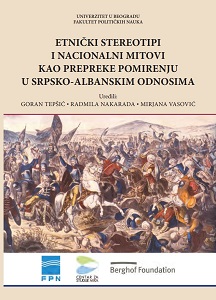



Diskriminacija je negativna društvena pojava. Nažalost, ona je globalno rasprostranjena – nema društva bez diskriminacije. Stoga je često posmatramo kao “normalnu” pojavu, što nas onemoćava da se protiv nje borimo jer je često i ne primećujemo obavljajući svoje svakodnevne rutine. U tom kontekstu je neophodno razviti svest i kritički potencijal društva da je prepozna, ali i da se bori protiv različitih oblika diskriminacije. Diskriminacija se sprovodi nad specifičnim grupama ljudi i individuama na osnovu njihove etničke, rasne, verske pripadnosti, pola/roda, godina storosti, seksualne orijentacije, fizičkih i mentalnih sposobnosti, političkih i drugih opredeljenja itd. Ona predstavlja nipodaštavački oblik delovanja prema specifičnim grupama ljudi, što cementira i dalje otežava njihov položaj. Zbog toga ove grupe nisu u mogućnosti da ostvare svoja prava i da imaju iste šanse kao i ostali.
More...
Padom komunizma krajem 80-ih godina 20. vijeka obnovljen je interes za prava nacionalnih manjima u cijeloj Evropi. Dok je većina evropske pažnje bila usmjerena na potencijalni etnički sukob na istoku, ovaj problem je postao važan za cijeli kontinent, ističe američka teoretičarka Tove Malloy u svojoj knjizi Nacionalne manjine u Evropi. Mediji u tranziciji ignorišu probleme manjina, osim ako nisu predmet kriminalističkog diskursa. Selekcija vijesti od izvora informacije do urednika u medijima, ima unutrašnju logiku – često nije eksplicitna već implicitna, i bitno utiče na načine reprodukcije stvarnosti.
More...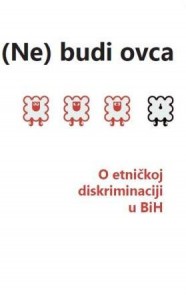
Rat na etničkoj osnovi u BiH završen je etničkom podjelom zemlje u Daytonu. Kako bi se sistem etničke podjele zemlje održao, odnosno kako bi se spriječila integracija zemlje, političke elite primorane su nakon rata podržati etničku diskriminaciju. Etnička diskriminacija ostala je najsnažniji i najdominantniji način održanja etničke podijeljenosti zemlje, odnosno separacije njenih javnosti. Rascjepkane javnosti impotentne su za bilo kakvu socijalnu reakciju na stanje u društvu. Odatle interes politike za upravo ovakvom javnošću.
More...
Pozicija Ostalih danas se primarno posmatra sa aspekta presude Sejdić-Finci protiv BiH, te se u tom smislu s posebnom pažnjom razmatraju prava Ostalih kao skupine u odnosu na kolektivna prava koja ostvaruju konstitutivni narodi. Često se pri tome zaboravljaju dvije činjenice: Ostali nisu homogena grupa okupljenih pojedinca i pojedinki koja dijeli nacionalno, etničko ili vjersko porijeklo, a drugo, brojni građani i građanke koji se izjašnjavaju kao pripadnici i pripadnice Ostalih zapravo ne traže kolektivna prava, već podizanje stepena uvažavanja individualnih prava u ustavnopravnom poretku BiH.
More...
BiH je talac vrijednosnog stava zaštite prava i sloboda konstitutivnih naroda – Bošnjaka, Hrvata i Srba, a na uštrb istih prava i sloboda Ostalih i nacionalnih manjina. Ova teza se potvrđuje dvojako kroz pitanje vitalnog nacionalnog interesa. Prvo, vitalni nacionalni interes često postaje i moćno sredstvo političkih manipulacija koje koči funkcionisanje BiH kao države. Drugo, ustavnopravna zaštita u slučaju isticanja vitalnih nacionalnih interesa u procesima odlučivanja, ekskluzivno je pravo predstavnika konstitutivnih naroda, ali ne i Ostalih. Sva pozitivna rješenja koja osiguravaju Ostalima učešće u vlasti, i dalje ovu kategoriju ostavljaju bez adekvatnih mehanizama za- štite njihovih kolektivnih prava.
More...
Sudjelovanje konstitutivnih naroda u sustavu vlasti u FBiH sastavni je i iznimno značajan element raznorodnog bh. pravnog, politič- kog, društvenog poretka. Naročitost (trenutačnog) bh. poretka, koja je ujedno i oprečnost, je svakako i postojanost u zanemarivanju učešća onih koji nisu konstitutivni u sustavu vlasti u (F)BiH. Iako su Nekonstitutivnima, u odnosu na učešće u sustavu vlasti na državnoj razini u BiH, na razini FBiH garantirana izvjesna prava, bez uveličavanja, njihov položaj je i dalje, formalnopravno, prominentno na granici ekskluzivizma. Uzevši u obzir i višegodišnji politički retorizam, bez razlike vladajućih i oporbenih političkih elita, i častoljublje u kojima se nastoji proponirati primjena presude Sejdić i Finci protiv BiH, gotovo je jasno da je osiguravanje jednakopravnog položaja Nekonstitutivnih u sustavu vlasti na svim razinama u BiH skopčano sa nemogućnošću uspjeha. Proporcija konstitutivnih obilježja i preferiranje pariteta konstitutivnih naroda mjerilo je na svim razinama vlasti, pa tako i na razini FBiH i razini kantona, gdje se etničko utemeljenje doživljava kao prijelomno za stabilitet cjelokupnog sustava. Istovremeno je na štetu Nekonstitutivnih, s obzirom da prostatično respondira sa umovanjem koje poriče obveznost njihovog učešća u sustavu vlasti, suprotno ustavnopravnim i međunarodnopravnim rješenjima, na koncu potvrđenim i putem sudbenog tijela u Strasbourgu. Čini se da antanta konstitutivnih „rješavanje“ položaja Nekonstitutivnih, istovremeno, doživljava kotvom koja ne dozvoljava kretanje BiH prema Europskoj uniji.
More...
U suočavanju sa postojećim konsocijacijskim modelom dijeljenja vlasti među konstitutivnim narodima, a koji nužno diskriminira nekonstitutivne, moguće je primijetiti dva usvojena modela. Jedan je onaj Kantona Sarajevo, gdje se „Ostale“ uzdiže u rang konstitutivnog naroda na način da predstavnik te grupe na jednak način sa predstavnicima konstitutivnih naroda participira u vršenju vlasti. U Brčko Distriktu usvojen je drugi model, gdje se vrši (de jure) deetniziranje postojećeg političkog režima, a interesi konstitutivnih naroda zaštićeni su izričito samo u onoj mjeri u kojoj je to nužno. Iako je formalno „jedinstvena administrativna jedinica lokalne samouprave“, Distrikt je zanimljiv za razmatranje s obzirom na njegovu multietničku strukturu, opseg nadležnosti, te razuđenost višestranačja u Skupštini, tako da se može smatrati kao „BiH u malom“. Zbog toga vrijedi razmotriti šta ova „laboratorija etničkog upravljanja“, kako je Distrikt opisao Florian Bieber, može reći o trenutnim polemikama oko predstavljanja nekonstitutivnih?
More...
Socijalizacija i socijalna inkluzija, dvije vrlo često zanemarivane funkcije obrazovanja, u bh. kontekstu predstavljaju marginalne teme, uglavnom izvan fokusa interesovanja ovdašnjih vlasti ali i – simptomatično – izvan diskursa nastavnog osoblja, pogotvo kada su posrijedi osnovno i srednje obrazovanje. U praksi, bh. obrazovanje popraćeno je nekim od drastičnijih vidova segregacije, prevashodno kroz podijeljeno obrazovanje, ali i kroz izostanak generalne senzibiliziranosti prema etničkim i kulturnim grupama koje su u određenoj obrazovnoj instituciji u manjini, čime se ustanovljavaju nesvjesni ili svjesni mehanizmi ekskluzije. Osim toga, bh. obrazovanje nedovoljno je osvijestilo svoju ulogu u očuvanju kulturne različitosti i pluraliteta etničkih identiteta. U tom smislu, integrativna društvena funkcija obrazovanja nikako ne smije postati asimilacijska, odnosno ne smije biti vođena asimilacijskim politikama. Mada dnevnopolitički diskurs obiluje frazama i floskulama o jednakopravnosti etničkih manjina i zalaganju za poboljšanje njihovog položaja, u praksi izostaju konkretne akcije i mehanizmi koji bi takvu retoriku imali prevesti u djelo, odnosno zbilju. Vjerovatno najbolji primjer jesu obrazovni problemi najbrojnije etničke manjine u BiH – Roma/kinja. Naime, bh. mediji kao i dio nevladinih organizacija duži niz godina upozorava na marginalizaciju Roma/ kinja u BiH, a uzrok problema, između ostalog, moguće je tražiti i u sferi formalnog obrazovanja.
More...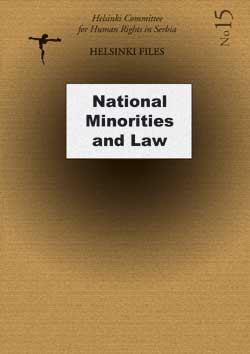
October 2000 political changeover did not produce the fundamental break with Milosevic's policy. There are numerous examples thereof, notably as regards Republika Srpska, Kosovo and Montenegro. Insistence on that orientation in the face of factual defeat had a negative impact on status of inter-ethnic relations in Serbia proper. National policy aiming at creating an ethnically pure Serb state ended with a catastrophic balance: hundreds of thousands of dead, several million displaced persons and refugees. In the past decade minorities, notably Croats (during the war in Croatia), Bosniaks (during the war in B&H) and Albanians (during the whole decade) bore the brunt of "ethnic-cleansing" policy. By extension, relations between the majority people and some minorities were exacerbated. In the meantime minorities have radicalised their stands and are waiting for resolution of their problems by dint of international community brokerage. Most conspicuous example of the aforementioned was South Serbia, in which the danger of conflict spill-over was great for a while. But thanks to NATO and other international organisations actions and efforts tension has eased and cooperation and revival of economy have been initiated owing to enormous political and financial support of the West.
More...
A large number of countries are becoming increasingly concerned over the issue of the national minorities rights and so is the international community. However, before the WWII human rights and freedoms and their protection were a province under an exclusive jurisdiction of states. Citizens enjoyed only those rights and freedoms bestowed on them by a ruler through the internal legal order and state laws. But such a system was faulty and insufficient, for it was amply manifest that some states in that way legitimised the racial, national, religious and ideological discrimination. Rights of national minorities are today a regular part of the catalogue of fundamental human rights and freedoms enshrined in the most important international charters and acts. Considering a large number of international laws dealing with the rights of national minorities, that issue is no longer within an exclusive competence of states. It has in fact become the subject of international-legal and political obligations of state and the one of universal and regional organisations. Basic preconditions for the exercise of fundamental human rights and freedoms and accordingly of national minorities rights are the existence of the legal state-the rule of love and ethnic tolerance. Without those preconditions one could hardly talk about the genuine existence, exercise and protection of human rights. The gist of protection of national minorities is the principle of banned discrimination on any grounds, the principle of equality of all before the law and existence of special measures ensuring the preservation of national, cultural, religious and linguistic identity of ethnic minorities. On the other hand the following issue is raised: how to ensure every citizen's right to preservation of his/her identity, culture, language and religion without reducing the stability of a community as a whole, and its sovereignty and territorial integrity, how to find a magical formula, a universal model applicable to all states. But the history has shown that such a magical formula did not exist. Each state facing the issue of relations between the majority and minority people had to build a specific model of their cohabitation, the one conditioned by historical legacy and current international circumstances. National legislation plays an important role in guaranteeing cultural, religious, ethnic, linguistic, national and other rights to national minorities through determination of those rights and providing guarantees for their exercise and protection. Regardless of a breadth and richness of a spectrum of national minorities' rights in a state, its existence does not imply its genuine implementation. What follows is an analysis of legal provisions (federal and republican) in place, in the light of guaranteeing the rights of national minorities, existence or absence of discriminating norms, internal harmonisation of those rights, and their harmonisation with constitutions and relevant international acts.
More...
General conclusion of this survey is that rights and freedoms of minorities in Serbia are no implemented in compliance with proclaimed principles and standards of international practice and law. Domestic legislation related to minority rights is not quite harmonised with international law in this sphere, and in practice is not implemented everywhere and always. But much has changed in this regard after the 5 October 2000 political changeover. Currently under way is harmonisation between domestic and international legislation, and efforts are made to consistently implement pertinent legal provisions in practice. New authorities in Serbia are manifesting their political will to comply with conditions set by the Council of Europe. In normative terms the most important move was adoption of the Act on Protection of Rights and Freedoms of National Minorities. This was preceded by the FRY accession to the Framework Convention for Protection of Rights of National Minorities and adoption of other documents of European legislation related to the national minorities (the OSCE recommendations from the Hague, Lund and Oslo). As regards normative protection of rights and freedoms of minorities in Serbia is it needed to urgently fine-tune domestic legislation to international legislation related to that sphere. In those terms it is necessary to first promulgate the new Constitution of Serbia, or at least amend the old one, so that its provisions guarantee a higher degree of protection of rights of national minorities, than the one guaranteed by the federal constitution. It is also necessary to amend the Act on National Minorities in terms of envisaging sanctions for state bodies when they violate rights of national minorities, or don't take measures to provide for full and effective equality of members of national minorities with the majority nation. And finally it is also necessary to fine-tune republican laws with the Federal Act on Protection of National Minorities, by striking off discriminating norms. Survey of implementation of legal provisions indicated that national minorities in Vojvodina exercise their rights better than minorities in Central Serbia. Added to that it seems that a turnaround has been achieved also in South Serbia, in municipalities of the Preševo valley mostly inhabited by Albanians. During Milosevic era their rights were grossly violated, while now they are better treated. But Albanians are still not treated equally as the majority people. However there is hope that through mutual understanding and patience things could improve even more in this regard. Added to implementation of the aforementioned Act and other pertinent acts by the state authorities, of major importance is the formation of the Federal Council for National Minorities and National Councils of National Minorities, with a view to exercising rights to selfrule in the area of use of minorities languages and alphabets, education, information and culture. Only Hungarians (by the date of publication of this survey) have formed their national council, while formation of other councils is still under way. Survey of national minorities also indicated that most minorities were not aware of their rights. Good news is that a vast majority of respondents is not interested in rights which are not regulated by law, and that they are ready to abide by the law in exercise of their rights. This is an encouraging sign for the process of democratisation of society, but one should not overlook the fact that minorities still considerably feel threatened. Better information of national minorities about their rights is also an important factor, as is enhanced information of the majority people that better exercise of minority rights is beneficial for them too, for thus are secured harmonious multi-ethnic relations without which political and economic stability of a multi-ethnic community of Serbis is not viable.
More...
General conclusion of this survey is that rights and freedoms of minorities in Serbia are no implemented in compliance with proclaimed principles and standards of international practice and law. Domestic legislation related to minority rights is not quite harmonised with international law in this sphere, and in practice is not implemented everywhere and always. But much has changed in this regard after the 5 October 2000 political changeover. Currently under way is harmonisation between domestic and international legislation, and efforts are made to consistently implement pertinent legal provisions in practice. New authorities in Serbia are manifesting their political will to comply with conditions set by the Council of Europe. In normative terms the most important move was adoption of the Act on Protection of Rights and Freedoms of National Minorities. This was preceded by the FRY accession to the Framework Convention for Protection of Rights of National Minorities and adoption of other documents of European legislation related to the national minorities (the OSCE recommendations from the Hague, Lund and Oslo). As regards normative protection of rights and freedoms of minorities in Serbia is it needed to urgently fine-tune domestic legislation to international legislation related to that sphere. In those terms it is necessary to first promulgate the new Constitution of Serbia, or at least amend the old one, so that its provisions guarantee a higher degree of protection of rights of national minorities, than the one guaranteed by the federal constitution. It is also necessary to amend the Act on National Minorities in terms of envisaging sanctions for state bodies when they violate rights of national minorities, or don't take measures to provide for full and effective equality of members of national minorities with the majority nation. And finally it is also necessary to fine-tune republican laws with the Federal Act on Protection of National Minorities, by striking off discriminating norms. Survey of implementation of legal provisions indicated that national minorities in Vojvodina exercise their rights better than minorities in Central Serbia. Added to that it seems that a turnaround has been achieved also in South Serbia, in municipalities of the Preševo valley mostly inhabited by Albanians. During Milosevic era their rights were grossly violated, while now they are better treated. But Albanians are still not treated equally as the majority people. However there is hope that through mutual understanding and patience things could improve even more in this regard. Added to implementation of the aforementioned Act and other pertinent acts by the state authorities, of major importance is the formation of the Federal Council for National Minorities and National Councils of National Minorities, with a view to exercising rights to selfrule in the area of use of minorities languages and alphabets, education, information and culture. Only Hungarians (by the date of publication of this survey) have formed their national council, while formation of other councils is still under way. Survey of national minorities also indicated that most minorities were not aware of their rights. Good news is that a vast majority of respondents is not interested in rights which are not regulated by law, and that they are ready to abide by the law in exercise of their rights. This is an encouraging sign for the process of democratisation of society, but one should not overlook the fact that minorities still considerably feel threatened. Better information of national minorities about their rights is also an important factor, as is enhanced information of the majority people that better exercise of minority rights is beneficial for them too, for thus are secured harmonious multi-ethnic relations without which political and economic stability of a multi-ethnic community of Serbis is not viable.
More...